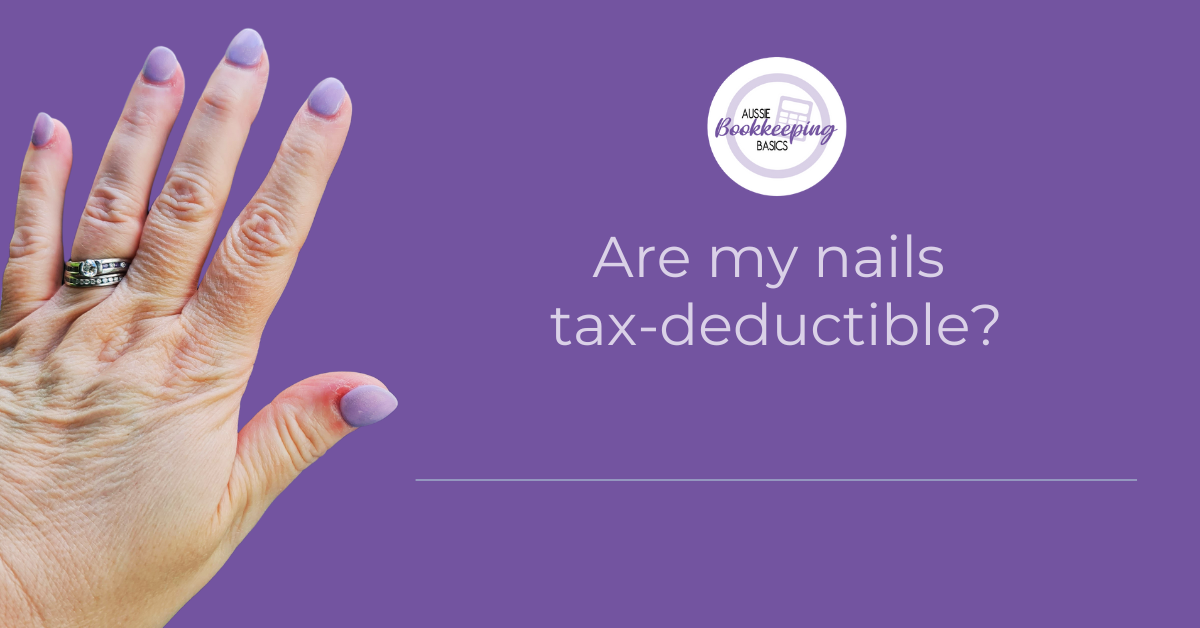Earlier this year, I got my nails done by professionals (see my related embarrassing yet relevant blog post about the situation I found when I tried removing them myself). While sitting there in the nail salon, having professional nail artists work on my nails, I was asked what colour nail polish I would like, and of course, I chose purple. Purple is not only my branding colour for Aussie Bookkeeping Basics (because, why not!), but also my favourite colour.
My choice of nail polish colour later led some friends and I down the rabbit hole that is tax deductions and business expenses. One friend (jokingly) asked if I was claiming them as a tax deduction given that they were done in my business branding colour. We giggled about this because this friend knows that as a bookkeeper, I often get on my soapbox about personal expenses being incorrectly claimed as business expenses. She’s witnessed that soap box a few times over the years!
It then got my friend and I chatting about the fact that, while my friend asked in jest, there are very likely business owners out there, for whom this question may indeed have them stopping to think. And thus this blog post was born!
As a small business owner, understanding the distinction between personal and business expenses is crucial, not just for maintaining proper financial records but also for ensuring compliance with tax regulations. One common area of confusion is whether personal expenses, especially those that seem related to the business, can be claimed as tax deductions. A prime example of this is the cost of getting your nails done in your brand colours, as I did. Despite its seemingly business-related nature, such an expense is personal and, therefore, not tax-deductible. Here’s why.
Defining Personal and Business Expenses
To begin with, it’s essential to understand what constitutes a personal expense and what qualifies as a business expense.
Business Expenses: These are costs that are both necessary and directly related to the operation of your business. Examples include office supplies, professional services, and advertising costs.
Personal Expenses: These are costs incurred for personal use and enjoyment, unrelated to the business. They include personal grooming (such as getting my nails done), clothing (unless it’s a specific uniform required for work, and meets the very strict ATO guidelines around the tax-deductibility of uniforms), and other non-business-related expenditures.
The ATO's Stance on Personal Grooming
According to the Australian Taxation Office (ATO), personal grooming expenses, such as haircuts, makeup, and manicures, are considered personal expenses. Even if you get your nails done in your brand colours (whether or not your intention is to promote a cohesive business image), the primary purpose of this expense remains personal grooming. Therefore, it does not meet the ATO’s criteria for a business expense.
The ATO is quite clear that for an expense to be deductible, it must be incurred in the course of earning assessable income. The cost of personal grooming does not satisfy this requirement as it is not directly linked to the earning of income, but rather to personal presentation.
Why Personal Grooming Isn't Deductible
There are several reasons why personal grooming, even when related to business activities, is not tax-deductible:
1. Private Nature: Personal grooming is inherently private and personal. The fact that you may wish to present yourself well for business purposes does not change the fundamental nature of these expenses.
2. Non-Exclusive Business Use: For an expense to be deductible, it must be used exclusively for business purposes. Personal grooming, by its nature, cannot be used exclusively for business, even if it has some incidental business benefit.
3. ATO Guidelines: The ATO explicitly states that expenses for personal appearance are not deductible. This includes costs for maintaining a professional image or complying with a dress code that is not specific to an occupation (such as a uniform).
Examples of Non-Deductible Personal Expenses
To provide further clarity, here are some examples of non-deductible personal expenses which are often mistaken as business-related:
-
- Clothing and Accessories: Unless it’s a specific uniform required for your job that has a logo or is otherwise distinctive (see the ATO guidelines for the specifics), regular clothing and accessories are considered personal expenses.
-
- Makeup and Haircuts: These are personal grooming expenses and are not deductible, even if they are done to maintain a professional appearance for work.
-
- Gym Memberships: While staying fit may help you perform better at work, the expense is personal and not deductible.
What Can* Be Deductible?
Understanding what can be deductible is equally important. Here are some examples of things that may* be legitimate business expenses:
-
- Office Supplies: Items like paper, pens, and other office necessities.
-
- Professional Services: Costs for legal advice, accounting services, and other professional consultations.
-
- Advertising: Costs associated with promoting your business, such as online ads, print materials, and promotional events.
Maintaining clear boundaries between personal and business expenses is essential for the financial health of your business and compliance with Australian taxation law. While it might seem beneficial to claim expenses like getting your nails done in brand colours as tax deductions, it’s crucial to adhere to the guidelines set by the ATO. Personal grooming remains a personal expense, and attempting to claim it as a business deduction could lead to complications or penalties.
Stay informed and consult with a tax professional to ensure your business expenses are accurately and appropriately claimed. By doing so, you’ll keep your financial records in order and avoid any unnecessary issues with the ATO.

—
*Just because it MAY be deductible, doesn’t mean it IS deductible in every situation.
**Disclaimer: This blog post is intended for informational purposes only and does not constitute financial or tax advice. For specific advice tailored to your business, please consult with a qualified tax professional.




